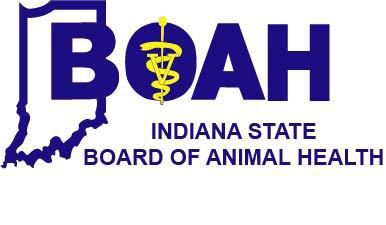CURRENT SITUATION
A 10-kilometer control area has been established around the index farm, primarily in Dubois County and a portion of northern Spencer County. The single infected site is in Dubois County. All commercial poultry flocks (18 total) within the control area are under quarantine for the duration of this event (i.e., until the control area is lifted).
Poultry farms in the control area have completed the first round of surveillance testing for HPAI to ensure the virus is not present in the area beyond the index farm. All tests were negative. Testing of the control area farms will continue on a weekly basis.
BOAH has established a surveillance zone around the control area to allow for additional monitoring for the presence of the virus in commercial poultry in the area. The zone extends an additional 10 km beyond the control area boundary. Commercial poultry operations in the surveillance zone are not under quarantine, but will be tested regularly (at less-frequent intervals) until the control area is lifted.
BOAH staff have reached out to known hobby/backyard poultry owners in the control area to schedule testing of birds to ensure the virus is not present. Hobby poultry owners in Southern Dubois County should contact BOAH at 317-544-2387 to schedule testing at no charge. BOAH staff have begun testing small poultry flocks in the control area and will continue to make appointments to make site visits.
The Indiana Department of Natural Resources is surveying the areas within and surrounding the control area for high populations of waterfowl to develop a strategy for wildlife surveillance. IN DNR is liaising with USDA-Wildlife Services staff in Indiana in this effort.
BACKGROUND
On Feb. 9, 2022, a confirmed case of H5N1 highly pathogenic avian influenza (HPAI) was identified in a single commercial turkey flock in Dubois County. This is the first report of HPAI in commercial poultry in the United States since 2020 and the first in Indiana since 2016.
Samples were collected from the birds on Feb. 7 and submitted to the Indiana Animal Disease Diagnostic Laboratory (ADDL) at Purdue University after approximately one hundred birds died, flock appeared lethargic and decreased consumption of water. Tests indicated a likely infection of an H5 avian influenza virus. Under standard protocols, the results were reported to the Indiana State Board of Animal Health (BOAH), which authorized prompt transport of the samples to US Department of Agriculture’s National Veterinary Services Laboratory (NVSL) in Ames, IA for confirmatory testing.
NVSL confirmed that the virus present was a highly pathogenic strain of H5N1 (with a Eurasian H5 goose/Guangdong lineage).
Upon confirmation of HPAI, the 29,000 turkeys in the flock (known as “Dubois 1”) were depopulated to prevent the spread of the disease in the area.
RESPONSE
BOAH is working with multiple state and federal partners to respond to this event, including Indiana Department of Health, Indiana Department of Homeland Security, Indiana Department of Natural Resources, Indiana Department of Environmental Management, and USDA Veterinary Services and Farm Service Agency.
PUBLIC ADVISORIES
Food Safety
Avian influenza does not present a food safety risk; poultry and eggs are safe to eat. Officials are not aware of any public health significance with this virus. No cases of human infection have been reported. Human health agencies will be monitoring workers and others in contact with birds to monitor for influenza-like illness.
Animal Health
Hobby poultry owners are encouraged to be aware of the signs of avian influenza and report illness and/or death to the USDA Healthy Birds Hotline: 866-536-7593. Callers will be routed to a state or federal veterinarian in Indiana for a case assessment. Dead birds should be double-bagged and refrigerated for possible testing. Signs include: sudden death without clinical signs; lack of energy or appetite; decreased egg production; soft-shelled or misshapen eggs; swelling or purple discoloration of head, eyelids, comb, hocks; nasal discharge; coughing; sneezing; lack of coordination; and diarrhea. A great resource for backyard bird health information is online at: www.aphis.usda.gov/aphis/ourfocus/animalhealth/animal-disease-information/avian/defend-the-flock-program/dtf-resources/dtf-resources. Situation updates and status reports about ongoing avian influenza activities, along with critical disease-related information, will be posted online at: https://www.in.gov/boah/species-information/avianbirds/highly-pathogenic-avian-influenza/. Users may subscribe to email and/or text updates on a subscribe link at that page.
Human Health
Community members who are affected by this animal health emergency to be aware of the possible impact on their mental health and to seek assistance if needed. Available resources include:
- Be Well Indiana: Feeling overwhelmed, stressed, anxious or alone? Call this free, confidential resource available 24/7 to anyone in the state of Indiana.
- Call 2-1-1 and enter your ZIP code.
- Follow the prompts and select number 3 for the Be Well Crisis Helpline.
- Farm Aid: This organization connects farmers with helpful services, resources and opportunities specific to their individual needs. Call the Farmer Hotline for immediate assistance Monday through Friday from 9:00 AM to 10:00 PM Eastern time.
- Call 1-800-FARM-AID (1-800-327-6243).
- National Suicide Prevention Lifeline: Provides 24/7, free and confidential support for people in distress, as well as prevention and crisis resources for you or your loved ones.
- Dial 9-8-8 or call 1-800-273-TALK (1-800-273-8255).






